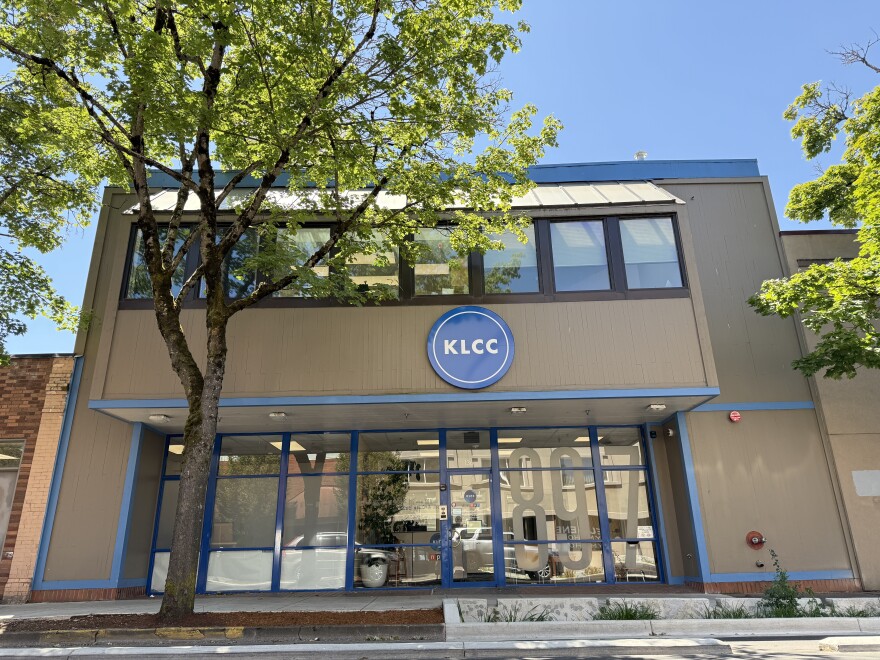Last week, Congress voted to accept a $9 billion rescission package that included rescinding $1.1 billion already allocated by Congress to fund the Corporation for Public Broadcasting.
KLCC's Love Cross sat down with general manager Jim Rondeau to discuss what that means for KLCC.
Love Cross: Jim, I think the first thing that needs some explanation is how funding for public media works.
Jim Rondeau: Yeah, well, without getting too far in the weeds, it sometimes feels like filling out a tax form, Love, but, public media funding, up until Friday, has been based the local revenue that we're able to raise, and there's a formula. There's a two-year advance appropriation, or there was, in effect. In other words, our revenue locally from 2024 was the way that the federal government decided how much KLCC would get in 2026. 2026 funding has just been completely zeroed out.
Sometimes people ask us what public media even means, and there are some people who think public means the government. It has always been for us right around 10% of our annual budget, and the other 90% was made up by local donors, just individual members, local foundations, and some Oregon businesses that supported KLCC. Now that equation does not include the federal government. So we are at about 85%, just general membership dollars and about 15% local underwriting, we call it - the support of local businesses.
Cross: So how much money was KLCC set to receive from the Corporation for Public Broadcasting before this happened?
Rondeau: Because 2024 was really an extraordinary year, the, the amount that we were expecting was somewhere around $350,000 to $360,000. That would be a high number for us. Generally it's more like $300,000, but 2024 was an exceptional year locally and that's how they determined the big final number.
Cross: Over the past few years, we've been working hard here at KLCC to build up the KLCC news team. We are stronger than ever in that regard, but I, like you, have heard from many listeners who are concerned about our future. What is it that you want them to know?
Rondeau: That this is a serious long-term problem. It's not a problem that one membership drive or fundraising campaign can fix. We have lost funding in recent years, so we're kind of used to this. We lost funding from our licensee a number of years ago. There was a serious downturn that most public media stations faced in business support during COVID and we weathered that. This is a serious ongoing threat. So, for the next number of years, about $300,000 or $350,000 that we would expect to receive as part of the budget that runs KLCC will not be there. It's a multi-year challenge and on top of the cash support that we are talking about, which is kind of the number this conversation is keyed to, there's also a number of things that we have to keep running. Like the satellite systems and the digital interconnections and music royalty payments that are traditionally paid for through the Corporation for Public Broadcasting. That future is uncertain and may cost the local stations quite a bit of extra money. So, if we're talking about in excess of $2 million over the next 5 years, it means some belt tightening for KLCC, but in the short term, our determination is that we just need to go out and see what we can do in terms of engaging the public, many of whom who don't support KLCC right now.
And so I guess if I would leave you with any message, it would be that we as a society- which sounds like a lofty way to frame the conversation- but we need to decide what access to high quality information is worth. It's one of the reasons that public radio exists in the first place, to provide a kind of journalism, a kind of cultural connection that the commercial broadcasting and commercial print world really was never set up to provide. And if we want that going forward, we're going to have to figure out a way to pay for it collectively. Much of that's going to be at the local level because Congress has decided that's it's not worth it.
Cross: KLCC has been around for 58 years, and what you're saying is with public support, we're not going anywhere soon.
Rondeau: We are not. We will be here. We have a very supportive public. We have a long-term challenge to engage ourselves in, a long-term problem to solve, but we are more determined than ever that we will get through it.




